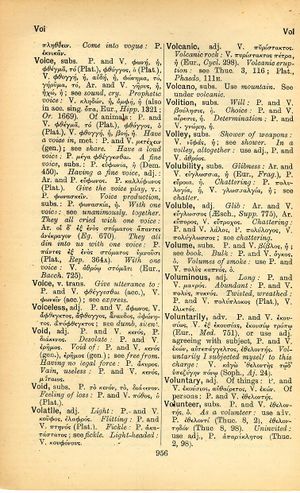voice
Ὁ αὐτὸς ἔφησε τὸν μὲν ὕπνον ὀλιγοχρόνιον θάνατον, τὸν δὲ θάνατον πολυχρόνιον ὕπνον → Plato said that sleep was a short-lived death but death was a long-lived sleep
English > Greek (Woodhouse)
subs.
P. and V. φωνή, ἡ, φθέγμα, τό (Plat.), φθόγγος, ὁ (Plat.), V. φθογγή, ἡ, αὐδή, ἡ, φώνημα, τό, γήρυμα, τό, Ar. and V. γῆρυς, ἡ, ἠχώ, ἡ; see sound, cry.
Prophetic voice: V. κληδών, ἡ, ὀμφή, ἡ (also in acc. sing. ὄπα, Eur., Hipp. 1321; Or. 1669).
Of animals: P. and V. φθέγμα, τό (Plat.), φθόγγος, ὁ (Plat.), V. φθογγή, ἡ, βοή, ἡ.
Have a voice in, met.: P. and V. μετέχειν (gen.); see share.
Have a loud voice: P. μέγα φθέγγεσθαι.
A fine voice, subs.: P. εὐφωνία, ἡ (Dem. 450).
Having a fine voice, adj.: Ar. and P. εὔφωνος. P. καλλίφωνος (Plat.).
Give the voice play, v.: P. φωνασκεῖν.
Voice production, subs.: P. φωνασκία, ἡ.
With one voice: see unanimously, together.
They all cried with one voice: Ar. οἱ δʼ ἐξ ἑνὸς στόματος ἅπαντες ἀνέκραγον (Eg. 670).
They all din into us with one voice: P. πάντες ἐξ ἑνὸς στόματος ὑμνοῦσι (Plat., Rep. 364A).
With one voice: V. ἁθρόῳ στόματι (Eur., Bacch. 725).
v. trans.
Give utterance to: P. and V. φθέγγεσθαι (acc.), V. φωνεῖν (acc.); see express.

